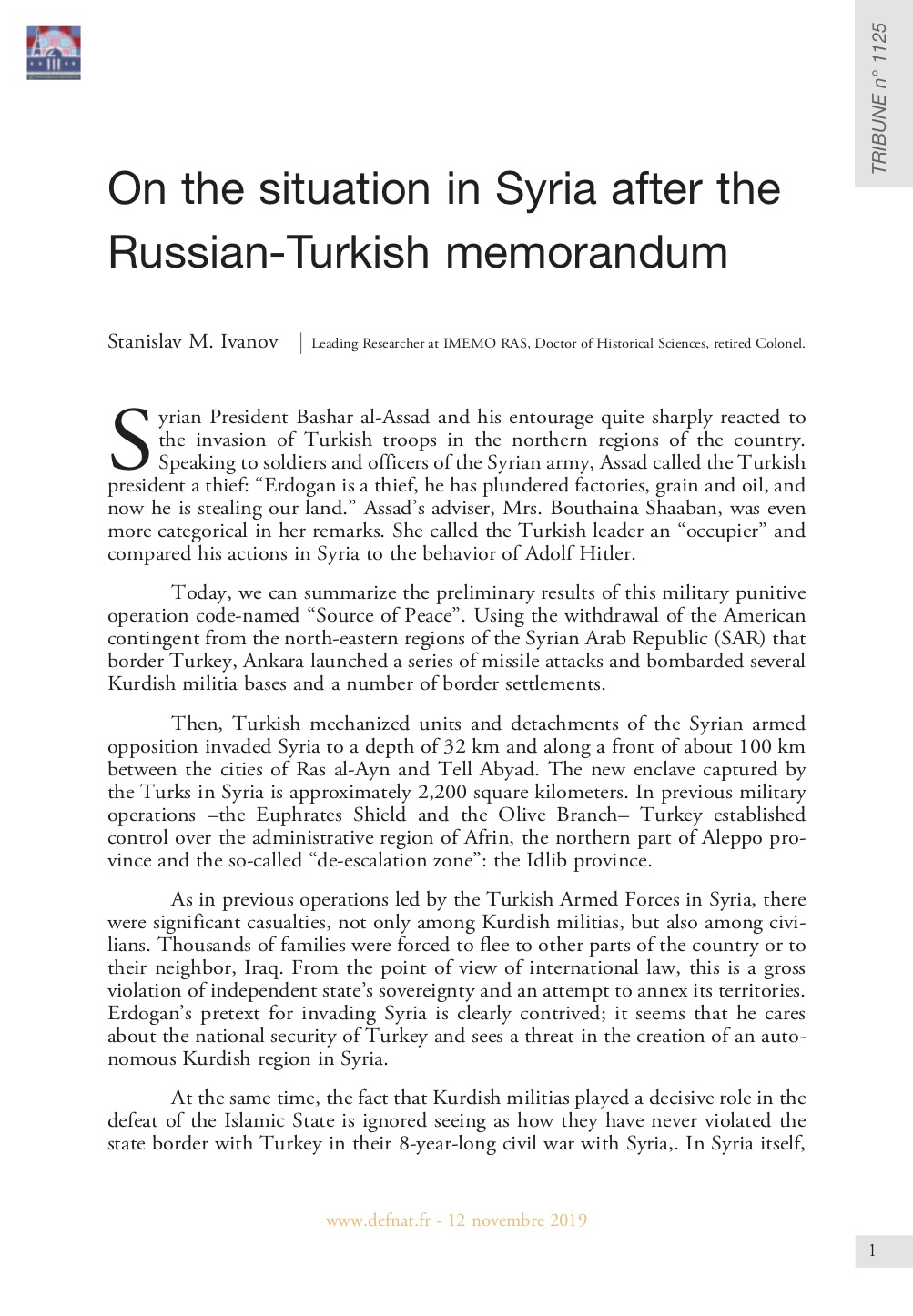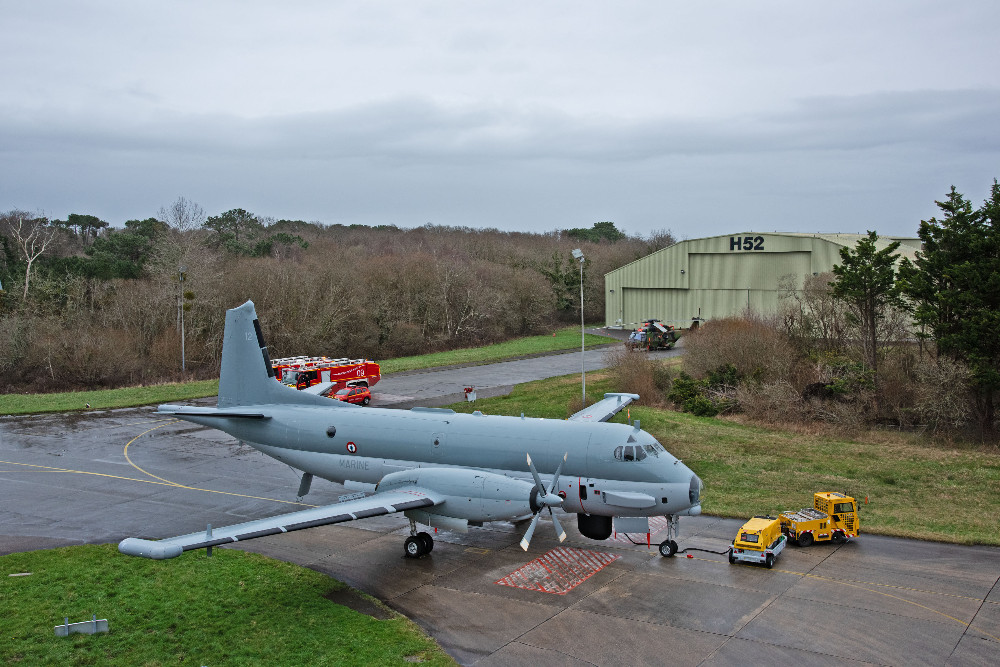Les tensions se sont aggravées sur le territoire syrien à cause de l’opération militaire décidée par Recep Erdogan contre les Kurdes. Face à cette situation, la communauté internationale semble osciller entre cynisme et impuissance. La rencontre entre Erdogan et Vladmir Poutine a débouché sur un mémorandum qui est loin de résoudre les problèmes.
On the situation in Syria after the Russian-Turkish memorandum (T 1125)
On the situation in Syria after the Russian-Turkish memorandum
Tensions have worsened in Syrian territory because of the military operation decided by Recep Erdogan against the Kurds. Faced with this situation, the international community seems to oscillate between cynicism and impotence. The meeting between Erdogan and Vladimir Putin has resulted in a memorandum that is far from solving the problems.
Syrian President Bashar al-Assad and his entourage quite sharply reacted to the invasion of Turkish troops in the northern regions of the country. Speaking to soldiers and officers of the Syrian army, Assad called the Turkish president a thief: “Erdogan is a thief, he has plundered factories, grain and oil, and now he is stealing our land.” Assad’s adviser, Mrs. Bouthaina Shaaban, was even more categorical in her remarks. She called the Turkish leader an “occupier” and compared his actions in Syria to the behavior of Adolf Hitler.
Today, we can summarize the preliminary results of this military punitive operation code-named “Source of Peace”. Using the withdrawal of the American contingent from the north-eastern regions of the Syrian Arab Republic (SAR) that border Turkey, Ankara launched a series of missile attacks and bombarded several Kurdish militia bases and a number of border settlements.
Then, Turkish mechanized units and detachments of the Syrian armed opposition invaded Syria to a depth of 32 km and along a front of about 100 km between the cities of Ras al-Ayn and Tell Abyad. The new enclave captured by the Turks in Syria is approximately 2,200 square kilometers. In previous military operations –the Euphrates Shield and the Olive Branch– Turkey established control over the administrative region of Afrin, the northern part of Aleppo province and the so-called “de-escalation zone”: the Idlib province.
As in previous operations led by the Turkish Armed Forces in Syria, there were significant casualties, not only among Kurdish militias, but also among civilians. Thousands of families were forced to flee to other parts of the country or to their neighbor, Iraq. From the point of view of international law, this is a gross violation of independent state’s sovereignty and an attempt to annex its territories. Erdogan’s pretext for invading Syria is clearly contrived; it seems that he cares about the national security of Turkey and sees a threat in the creation of an autonomous Kurdish region in Syria.
At the same time, the fact that Kurdish militias played a decisive role in the defeat of the Islamic State is ignored seeing as how they have never violated the state border with Turkey in their 8-year-long civil war with Syria,. In Syria itself, Kurdish militias remain neutral and are ready to cooperate with any authorities in Damascus who take their national rights and freedoms in the new constitution into account.
Kurdish relations with central authorities are an internal affair of the SAR. If Erdogan actually feared any threats from the Syrian Kurds, he could strengthen his border by creating a “security zone” on his territory. But, for many years, he kept its southern border “transparent” for Islamic State jihadists traveling through Turkey to Syria and Iraq. Moreover, he and his entourage established mutually beneficial relations with the Islamic caliphate, as well as purchased oil, agricultural products, and museum artifacts at reduced prices. Wounded Islamist fighters were treated in Turkish hospitals, underwent military training, and received weapons. The ties of the Turkish leadership with radical Islamist groups of a terrorist orientation (Muslim Brotherhood, Hamas, Jabhat al-Nusra, etc.) are well-known.
Now, Erdogan is trying to call the terrorists the winners of the ISIS – the Syrian Kurds. Ankara even pulled into the light and is trying to revive the long-lost Adan agreement with Damascus, signed in 1998, which allowed earlier Turkish forces to pursue the militants of the Turkish Workers' Party of Kurdistan to a depth of 5 km in Syria. However, today, diplomatic relations between Turkey and Syria are nonexistent. Both of the country’s leaders mutually accuse each other of state terrorism. Erdogan considers Assad an illegitimate president and the culprit of the death of a million of Syrians. Therefore, what kind of bilateral agreement giving the right to the Turkish military to invade Syria could be discussed?
Some optimism is inspired by the Russian-Turkish Memorandum signed recently in Sochi regarding the situation on the Turkish-Syrian border. Its main content is the cessation of Turkey’s military operation in Syria and, as a result, the cessation of the mass killings of Syrian citizens by Turkish aggressors and their satellites (the Syrian armed opposition and radical Islamist groups). But hundreds of Syrian victims could have been avoided if Washington and Moscow had not given Turkey the green light for the military-punitive operation. Erdogan managed to convince his partners in Washington and Moscow that he intended to fight terrorism in Syria. D. Trump, with particular cynicism, said: “Let the Turks and Kurds shoot at each other a little, and then make peace.” Several negative aspects of the Memorandum can be considered: Moscow’s consent to Erdogan’s further occupation of significant territories of Syria; permission for Turkish troops to invade this country in order to patrol together with Russia to a depth of 10 km; support for Ankara’s plans to move up to 1 million Syrian refugees from Turkey to the occupied lands and to the so-called “security zone”.
At the same time, no one wonders why the Syrians, who fled from the actions of government troops and who live in relatively equipped camps in Turkey, should move to border areas of Syria that are deserted with no infrastructure. The deployment of the Syrian border troops on the Syrian-Turkish border will also be problematic since there are no such troops in the SAR yet and it is not simple to create them from the remnants of the regular army. About half of Assad’s troops are Shiite foreigners (Iranians, Lebanese, Afghans, Pakistanis, Iraqis, and others) who cannot be sent to the Turkish border. Moreover, other questions will arise, such as where to place the Assad’s troops and battalions of the Russian military police, how to supply them with fuel and lubricants, food, or who will guard several tens of thousands of captured ISIS soldiers and their families. These problems remain to be decided by Damascus and Moscow. So far, the memorandum suspended the hostilities, but it has not brought a solution to the protracted Syrian conflict any closer.
SAR and Iran will never accept protracted stay of Turkish troops and pro-Turkish armed forces Syria. Erdogan’s declaration about an independent, united and indivisible Syria is intended only for Moscow, but cannot deceive Damascus and Tehran. They understand that Ankara will continue to seek to expand its bridgehead and strengthen the armed opposition and radical Islamists in the SAR in order to bring representatives of the Arab-Sunni majority led by the Muslim Brotherhood to power. Erdogan will never refuse to create a pro-Turkish Syria (without Assad and his Iranian sponsors).
In such an environment, one should hardly count on the adoption of a new Syrian constitution. The protagonists –the participants in the Syrian conflict, Turkey and Iran– have completely opposite views on the future Syria. Accordingly, one should not expect any general presidential and parliamentary elections in the coming months. In addition, only one third of the country’s population lives in Assad-controlled territories; the other two thirds are in refugee camps abroad or have remained in areas not controlled by Damascus. Therefore, organizing general and legitimate elections in such conditions is very problematic. ♦








